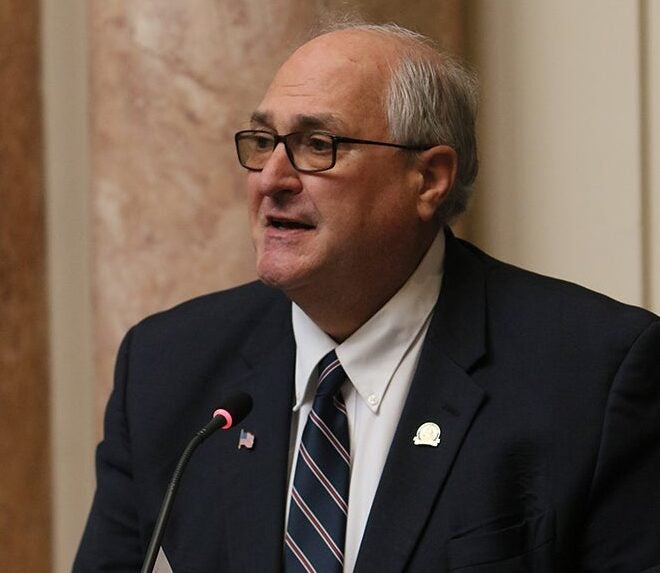Bill banning NDAs involving student-teacher misconduct passes House
Published 2:28 pm Monday, February 12, 2024

- Rep. James Tipton, R-Taylorsville, presents House Bill 275, an act related to teacher misconduct, on the House floor Thursday. (Legislative Research Commission)
A bill prohibiting schools from entering into nondisclosure agreements related to abusive conduct involving minors or students is moving forward.
After unanimous House approval, Rep. James Tipton’s House Bill 275 will move to the Senate. Last year, a similar bill stalled in the Senate. Tipton said that a few questions about the bill weren’t able to be resolved before the end of session.
Why this bill?
Tipton, R-Taylorsville, said that his bill is an attempt to prevent a “sad reality.”
“This is a piece of legislation that I honestly wish we didn’t have to deal with,” he said on the House floor. “And I’m gonna say that 99.9% plus of educators and teachers who work in the school system are there to support our children, to help them in their education.”
However, there are incidents in which a teacher abuses their authority or a student’s trust.
University of Kentucky student Kotomi Yokokura shared her story a few weeks ago during an Education Committee meeting.
Yokokura is a survivor of grooming and sexual abuse by one of her high school teachers. Her teacher emotionally manipulated her and flirted with her in front of other adult school staff, which convinced Yokokura that his behavior was normal.
After the teacher began tutoring Yokokura, the behavior escalated to sexual abuse.
Although another adult reported the behavior, after the principal questioned the teacher and Yokokura’s parents, who didn’t know about any of it, the matter was dropped.
In college, Yokokura struggled with the realization of what happened to her. She also learned that the same teacher recently confessed his love to another recent high school graduate and continues to text high school students individually.
“The teacher who abused me did not stop after his actions were first questioned,” she said.
“And I wish I could tell you that my experience is unique. But since I last sat here before the Education Committee less than a year ago, I’ve had friends, community members, teachers and strangers tell me their story or a story that happened in their community.”
What’s in the bill?
HB275 defines abusive conduct as misconduct involving a minor or student, including sexual misconduct and conduct subject to mandatory reporting.
Under Kentucky law, mandatory reporting includes dependency, neglect, abuse, human trafficking or female genital mutilation.
The bill states that if a teacher at a public school or certified nonpublic school is accused of abusive misconduct, the principal must document it and report it to the superintendent.
The superintendent will then conduct an investigation to completion to determine whether the allegations are substantiated. If the allegations are determined to be false, all records and references to the allegation will be removed from the teacher’s personnel file.
However, if the allegations are true, public and certified nonpublic schools would not be allowed to enter into a nondisclosure agreement with the teacher.
The bill would also work from the other direction – the application process. All applicants would have to disclose any schools they’ve previously worked at, and whether they were the subject of an allegation, investigation or disciplinary action in the past year.
Applicants would have to agree to a reference check and information requests. Previous schools would be required to disclose any disciplinary action related to abusive conduct.
The final piece of the bill would require trainings on appropriate relationships and communications with students.
The Kentucky Department of Education and the Educational Professional Standards Board would work together to create a curriculum, which every employee would take during the 2025-26 school year, and once every five years thereafter.
A few legislators asked Tipton whether this would protect the privacy of minors. Tipton responded that current law, including FERPA, already ensures that minors’ names are redacted in any information requests.
“It is certainly not the intent to allow private information of a minor child to become public,” he said.





